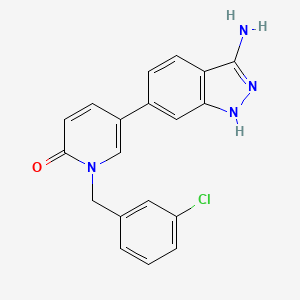Drug Information
Drug (ID: DG01661) and It's Reported Resistant Information
| Name |
SEL201
|
||||
|---|---|---|---|---|---|
| Synonyms |
SLV-2436; 2095704-43-9; SEL-201; CID 129052025; CHEMBL4764756; 5-(3-Amino-1H-indazol-6-yl)-1-[(3-chlorophenyl)methyl]pyridin-2-one; SEL201; SCHEMBL18764462; SLV2436; BCP29427; SLV 2436; VID70443; BDBM50562615; s6888; SEL201-88; BS-15825; HY-112113; CS-0043363; D80426; 5-(3-amino-1H-indazol-6-yl)-1-(3-chlorobenzyl)pyridin-2(1H)-one; SLV 2436 pound>>SLV2436 pound>>SEL201-88; SEL-201 pound>>SEL201 88; SEL 201 pound>>SEL20188; SEL201
Click to Show/Hide
|
||||
| Structure |

|
||||
| Click to Show/Hide the Molecular Information and External Link(s) of This Drug | |||||
| Formula |
3
|
||||
| IsoSMILES |
C1=CC(=CC(=C1)Cl)CN2C=C(C=CC2=O)C3=CC4=C(C=C3)C(=NN4)N
|
||||
| InChI |
InChI=1S/C19H15ClN4O/c20-15-3-1-2-12(8-15)10-24-11-14(5-7-18(24)25)13-4-6-16-17(9-13)22-23-19(16)21/h1-9,11H,10H2,(H3,21,22,23)
|
||||
| InChIKey |
YQVUADHJKWJHAF-UHFFFAOYSA-N
|
||||
| PubChem CID | |||||
Type(s) of Resistant Mechanism of This Drug
Drug Resistance Data Categorized by Their Corresponding Diseases
ICD-02: Benign/in-situ/malignant neoplasm
| Drug Sensitivity Data Categorized by Their Corresponding Mechanisms | ||||
|
|
||||
| Key Molecule: Mast/stem cell growth factor receptor Kit (KIT) | [1] | |||
| Sensitive Disease | Melanoma [ICD-11: 2C30.0] | |||
| Molecule Alteration | Missense mutation | p.L576P (c.1727T>C) |
||
| Experimental Note | Identified from the Human Clinical Data | |||
| In Vitro Model | MM61 cells | N.A. | N.A. | N.A. |
| MM111 cells | N.A. | N.A. | N.A. | |
| M230 cells | Skin | Homo sapiens (Human) | CVCL_D749 | |
| LND1 cells | Skin | Homo sapiens (Human) | CVCL_J076 | |
| HBL cells | Skin | Homo sapiens (Human) | CVCL_J075 | |
| In Vivo Model | CD-1 mouse PDX model | Mus musculus | ||
| Experiment for Drug Resistance |
SRB assay; Crystal violet staining assay; Promega assay | |||
| Mechanism Description | c-KIT stimulates MAP kinase-interacting serine/threonine kinases 1 and 2 (MNK1/2), which phosphorylate eukaryotic translation initiation factor 4E (eIF4E) and render it oncogenic. Depletion of MNK1/2 in melanoma cells with oncogenic C-KIT inhibited cell migration and mRNA translation of the transcriptional repressor SNAI1 and the cell cycle gene CCNE1. This suggested that blocking MNK1/2 activity may inhibit tumor progression, at least in part, by blocking translation initiation of mRNAs encoding cell migration proteins. | |||
| Key Molecule: Mast/stem cell growth factor receptor Kit (KIT) | [1] | |||
| Sensitive Disease | Melanoma [ICD-11: 2C30.0] | |||
| Molecule Alteration | Missense mutation | p.D820Y (c.2458G>T) |
||
| Experimental Note | Identified from the Human Clinical Data | |||
| In Vitro Model | MM61 cells | N.A. | N.A. | N.A. |
| MM111 cells | N.A. | N.A. | N.A. | |
| M230 cells | Skin | Homo sapiens (Human) | CVCL_D749 | |
| LND1 cells | Skin | Homo sapiens (Human) | CVCL_J076 | |
| HBL cells | Skin | Homo sapiens (Human) | CVCL_J075 | |
| In Vivo Model | CD-1 mouse PDX model | Mus musculus | ||
| Experiment for Drug Resistance |
SRB assay; Crystal violet staining assay; Promega assay | |||
| Mechanism Description | c-KIT stimulates MAP kinase-interacting serine/threonine kinases 1 and 2 (MNK1/2), which phosphorylate eukaryotic translation initiation factor 4E (eIF4E) and render it oncogenic. Depletion of MNK1/2 in melanoma cells with oncogenic C-KIT inhibited cell migration and mRNA translation of the transcriptional repressor SNAI1 and the cell cycle gene CCNE1. This suggested that blocking MNK1/2 activity may inhibit tumor progression, at least in part, by blocking translation initiation of mRNAs encoding cell migration proteins. | |||
References
If you find any error in data or bug in web service, please kindly report it to Dr. Sun and Dr. Yu.
